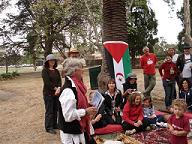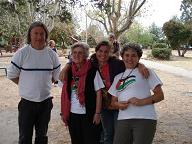“Queen of the desert blues and voice of the Sahrawi people”
 In March 2017 Aziza Brahim performed at the Brunswick Music Festival, Brunswick Town Hall.
In March 2017 Aziza Brahim performed at the Brunswick Music Festival, Brunswick Town Hall.
Coming to international attention in 2014 after the release of her third album Soutak, Aziza Brahim tours extensively across the globe. In Melbourne for the first time and for one show only, the queen of the desert blues, performed music from her sublime 2016 release Abbar El Hamada.…
Powerfully voiced with arresting and spellbinding grace, Aziza’s languid laments tell of the Western Sahara refugee plight – a tale of both hardship and uplifting hope against all odds. Her music traverses an electrifying expanse between the dusty plains of her Western Saharan roots, the upbeat Latin rhythms of the Cuba of her youth and Spain, her adopted homeland.
Aziza is both a highly potent sonic poet and the voice of the Saharawi people in their ongoing struggle for recognition and justice. Innovation, truth, humility and political outspokenness are the raw materials of her vision.
———————————————————–
AWSA celebrated the Saharawi national day 2009 in Melbourne


Australia Western Sahara Association (AWSA) celebrates the Saharawi national day 2009 in Melbourne
AWSA organised on Sunday 1 March in Alphington park in Melbourne a public event to mark the 33rd anniversary of the proclamation of the Saharawi Republic.
Georgia Vlassopoulos, chair of AWSA (Victoria) welcomed all those who attended the event to celebrate the Saharawi National Day and said “The Saharawis have used their exile constructively and built a democratic state which could transfer to government of their country. Let’s hope that this chance will come sooner rather than later”.
The Polisario Representative, Kamal Fadel thanked all those who attended the event on behalf of the Saharawi people.
The event was attended by many members of AWSA and their families as well as the Polisario Representative in Australia.
A barbecue was provided and a Saharawi tea ceremony was performed.
Australia Western Sahara Association (AWSA) was set up to raise awareness and promote the Saharawi cause in Australia, and to campaign for a free and fair referendum on self-determination for the Saharawi people.
————————————————
Saharawi flag raised in Australia to commemorate the Saharawi National Day
Each year the flag of the Saharawi Republic (SADR) is raised on the Town Halls of Leichhardt (Sydney), Newcastle and in various cities and towns of Australia such as Melbourne, Perth, Hobart, Geelong and Darwin. The flags are raised to mark the anniversary of the proclamation of the Saharawi republic.
The Saharawi flag is officially raised in Australia for the first time as a gesture of solidarity and friendship with the Saharawi people.
During the 2009 flag raising ceremony held at Leichhardt Town Hall, Councillor Jamie Parker, the Mayor said
“Leichhardt Council passed a unanimous motion to raise the flag of Saharawi Republic on their special day as a gesture of solidarity and friendship with the people of Western Sahara. He added “This commemorates 33 years since the people of Western Sahara declared a republic in Western Sahara to fill the vacuum left by the withdrawal of Spain the then colonial power.” And further added that “This is also significant because it will be the first time the flag of the Saharawi Republic has been flown officially in Australia”
The Saharawi representative to Australia, Kamal Fadel, expressed the gratitude and sincere thanks of the Saharawi people and emphasised that raising the Saharawi flag is a significant way of expressing solidarity and support to the Saharawis’ just cause. He added that through the gesture of raising the Saharawi flag, Australians are so raising their voices against the dreadful injustice caused to the innocent Saharawi people.
Members of the Australia Western Sahara Association and friends of Western Sahara attended the flag raising ceremonies held all over Australia.
Leichhardt Town Hall
Newcastle Town Hall
Melbourne ceremony
———————————————————–
5 June – 3 August 2007 – Malainin Lakhal’s tour of Australia and New Zealand
http://www.upes.org/body1_eng.asp?field=sosio_eng&id=286
WEEK 1 – Melbourne
Tuesday 5 June
1.15pm: A journalist from Western Sahara tells his story.
Sought by the Moroccan occupying forces for his part in a peaceful sit-in, Malainin Lakhal decided to escape rather than face another spell in gaol. Taking refuge with 160,000 other Saharawis in camps near Tindouf, he found he could help get the story out to the world of what is happening in the occupied territory.
Victoria University, School of Social Sciences, Room G470, Footscray Park Campus, Cnr Ballarat and Geelong Rds. Melways Map: 42 Ref C-2
6pm-7pm: Human rights issues in occupied Western Sahara with the Parliamentary Amnesty Group, hosted by Don Nardella MLA, Victorian Parliament Building, Spring Street, Room K, (book with Ron Guy 0428 173 970)
7.30pm Welcome Dinner at Nyala African restaurant, 131 Brunswick Street, Fitzroy, $30,
Wednesday 6 June
12noon-1pm: Western Sahara: violation of Saharawi indigenous rights in the last colony in Africa.
Morocco’s 32 year occupation of Western Sahara forced over half the Saharawi population to flee their homes and live in exile in refugee camps in south west Algeria. Those who remained in the occupied territories suffer daily human rights abuses at the hands of the Moroccan occupying forces. What Saharawis want is just to exercise their right to self-determination in accordance with UN resolutions. Why has the plight of Saharawis been ignored for so long?
Centre for Australian Indigenous Studies, Monash University, Clayton Campus, room 228, 2nd floor Gallery Building (Building 55).
_______________________________________________
.
Malainin Lakhal
Australia Western Sahara Association (AWSA) hosted Malainin Lakhal, a journalist from Western Sahara, as he toured Australia and New Zealand. Malainin spoke at public meetings in Sydney, Melbourne, Canberra and Perth and in New Zealand.
Malainin, an English graduate of Agadir University, was sought by police as a suspected ring-leader of the Saharawi resistance in the occupied Territory.
Since 2000 he has been living in the Saharawi refugee camps near Tindouf in SW Algeria, working as a teacher, a translator for the Saharawi Press Service, a journalist and as secretary-general of UPES, the Saharawi writers’ and journalists’ union.
Through this work he supports his friends still living in the occupied zones, bringing the human rights abuses they suffer daily to the attention of the world.
